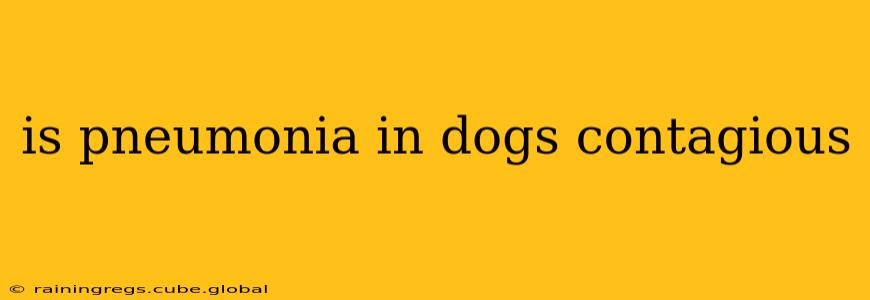Pneumonia in dogs is a serious respiratory illness, and a common question among concerned pet owners is whether it's contagious. The answer, unfortunately, isn't a simple yes or no. The contagiousness of pneumonia in dogs depends heavily on the cause of the pneumonia. Let's delve into the specifics.
What Causes Pneumonia in Dogs?
Canine pneumonia isn't a single disease but rather an inflammation of the lungs caused by various factors. These include:
-
Bacterial infections: These are some of the most common causes, with Bordetella bronchiseptica and Mycoplasma species being frequently implicated. These bacteria can spread from dog to dog, making pneumonia caused by these agents contagious.
-
Viral infections: Viruses like canine influenza, canine adenovirus type 2, and parainfluenza can also lead to pneumonia. Viral pneumonia is often contagious, spreading through direct contact or airborne droplets.
-
Fungal infections: Less common, fungal infections can also cause pneumonia. These are generally not highly contagious among dogs.
-
Aspiration pneumonia: This occurs when foreign material, such as food or vomit, is inhaled into the lungs. This is not contagious.
-
Parasites: Certain parasites can also lead to pneumonia. This type is also not contagious.
-
Underlying conditions: Pneumonia can also be secondary to other diseases or conditions weakening the dog's immune system, such as heart disease or cancer. These are not contagious in themselves.
Is Pneumonia Caused by Bacteria Contagious?
Yes, pneumonia caused by bacteria like Bordetella bronchiseptica and Mycoplasma species is contagious. These bacteria can spread through direct contact (e.g., sniffing, licking, sharing water bowls), or through airborne transmission (e.g., coughing). Dogs in close contact, like those in kennels or shelters, are at higher risk.
Is Viral Pneumonia Contagious?
Similarly, viral pneumonia is also highly contagious. Canine influenza, for instance, spreads easily through airborne droplets produced when an infected dog coughs or sneezes. This is why outbreaks are more common in situations with many dogs in close proximity.
How is Canine Pneumonia Spread?
The transmission methods vary depending on the causative agent. However, some common pathways include:
- Direct contact: Sniffing, licking, or physical contact with an infected dog.
- Airborne transmission: Inhaling infectious droplets expelled by an infected dog through coughing or sneezing.
- Indirect contact: Touching contaminated surfaces (e.g., water bowls, toys) and then touching their nose or mouth.
What are the Symptoms of Pneumonia in Dogs?
Recognizing the symptoms is crucial for prompt veterinary care. Common signs include:
- Coughing: Often persistent and may be dry or productive (with mucus).
- Lethargy: Loss of energy and decreased activity.
- Fever: Elevated body temperature.
- Difficulty breathing: Rapid or labored breathing, shortness of breath.
- Nasal discharge: Runny nose, potentially with mucus.
- Loss of appetite: Decreased interest in food.
- Weight loss: Noticeable decrease in body weight.
How is Pneumonia in Dogs Diagnosed and Treated?
Diagnosis involves a thorough physical examination, chest X-rays, and potentially blood tests to identify the causative agent. Treatment depends on the underlying cause and may involve antibiotics (for bacterial infections), antiviral medications (for viral infections), supportive care (e.g., fluids, oxygen therapy), and rest.
Can I Prevent My Dog from Getting Pneumonia?
While complete prevention is difficult, you can minimize the risk by:
- Vaccination: Vaccines are available for some of the common viral and bacterial causes of pneumonia.
- Avoiding contact: Limit contact with sick dogs.
- Hygiene: Regularly clean and disinfect your dog's belongings.
- Maintain a healthy immune system: Ensure your dog receives proper nutrition and exercise.
This information is for general knowledge and should not be considered a substitute for professional veterinary advice. If you suspect your dog has pneumonia, contact your veterinarian immediately for diagnosis and treatment. Early intervention is vital for a positive outcome.
